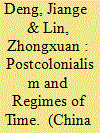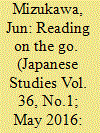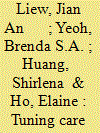| Srl | Item |
| 1 |
ID:
193218


|
|
|
|
|
| Summary/Abstract |
Temporality is important for understanding Hong Kong's postcolonial status since its handover from Britain to China in 1997. This study examines the mediated regimes of postcolonial temporalities in coverage of five anniversaries of the Hong Kong handover (between 1998 and 2020) in Chinese and British newspapers. In 1998, the Chinese and British press shared a significant consensus regarding the “legitimate continuity” of Hong Kong's colonial legacies; however, this consensus was increasingly undermined by ideological contestations surrounding the city's postcolonial ruptures and differences. The multiple temporal claims that emerged in Chinese and British newspapers were systemized within a proposed framework that combined temporal modes (the “formal structures” of temporal relations) and ideological appraisals (the “general politics” where temporal modes are (il)legitimized and (ab)normalized). The temporal complexity concerning Hong Kong exemplifies the former colony's dilemmatic “in-betweenness” and temporal inconclusiveness, which create an open discursive space that invites ideological investments by powerful symbolic stakeholders.
|
|
|
|
|
|
|
|
|
|
|
|
|
|
|
|
| 2 |
ID:
147070


|
|
|
|
|
| Summary/Abstract |
This article examines the phenomenon of the cellphone novel in contemporary Japan. In contrast to dominant approaches that have focused on questions of literary merit, I explore the tempos and temporalities of the cellphone novel as reading ‘on the go’. Drawing on ethnographic accounts, I attempt to develop the notion of reading ‘on the go’ so that we may move beyond prevailing discussions of cellphone novels, which have focused mainly on the literary sophistication, or lack thereof, of cellphone novels and novelists. Additionally, I argue that there is underlying tension between ‘literature’ and ‘Literature’ vis-à-vis questions of ‘proper’ reading tempos among Japanese readers. In order to explore the political, ideological, and aesthetic ramifications of changing reading and writing practices, this article places the twenty-first century controversy over cellphone novels in dialogue with a historical precedent, the early modern literary movement known as the unification of spoken and written Japanese (genbun itchi). In so doing, the article examines a corollary relation between changes in literary trends and spatiotemporal transformations that provide a reading and writing environment. Ultimately, the article suggests that the ongoing spatiotemporal reconfigurations and negotiations prompted by the evolving digital media communication network, its infrastructure, and accompanying commercial industries play a critical role in informing how contemporary practices of reading and writing take shape.
|
|
|
|
|
|
|
|
|
|
|
|
|
|
|
|
| 3 |
ID:
176476


|
|
|
|
|
| Summary/Abstract |
The literature on care relations and eldercare has directed attention towards recognising the interdependence between ‘carer’ (familial caregiver or home support worker) and the ‘cared for’ (the older person). Such an approach gives attention to the contingencies and entanglements that shape the relationships among differently positioned members of care dyads. Drawing on in‐depth and ‘go‐along’ interviews, we examine how relations between migrant caregivers and their non‐migrant elderly charges in Singapore are spatially negotiated – formulated, sustained and reworked – on an everyday basis through Alfred Schütz's framework of intersubjective ‘tuning’. Owing to the unequal ways that migrant caregivers are positioned within Singapore society, moments of positive family‐like regard towards them are almost always preceded/superseded by forms of negativity and vice versa. The employer–employee care dyad is therefore best understood as a relational process that requires constant ‘tuning’, as the elderly employer needs care which no one else will provide, while the employee needs the job in order for the migration gamble to succeed. The paper concludes by drawing together the spatial and temporal insights that the conceptual approach of ‘tuning’ brings to analyses of care relations.
|
|
|
|
|
|
|
|
|
|
|
|
|
|
|
|